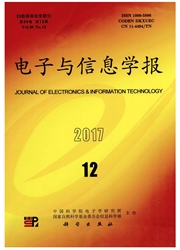

 中文摘要:
中文摘要:
在非均匀环境中,缺乏独立同分布的训练样本会使空时自适应处理(Space—Time Adaptive Processing,STAP)算法性能严重下降。针对这个问题,该文提出一种基于环境动态感知的空时自适应处理方法。该方法首先通过发射一组正交信号感知观测场景获取杂波信息;然后利用杂波信息结合平台参数及系统参数预测未来一段时间内杂波的协方差矩阵;最后将预测的协方差矩阵与样本协方差矩阵进行组合以构造空时滤波器。仿真结果表明,与传统的知识辅助类STAP算法相比,该方法在缺乏准确先验知识的情况下依然可以有效地抑制非均匀环境中的杂波。
 英文摘要:
英文摘要:
In heterogeneous clutter environments, Space-Time Adaptive Processing (STAP) shows notable performance degradation for lacking sufficient Independent Identically Distributed (IID) training samples. To solve this problem, a STAP approach is proposed based on dynamic environment sensing. With transmitted signal being orthogonal waveform, the clutter information is achieved. Then the clutter information and platform parameters are used and a clutter covariance matrix at future time is obtained incorporating system parameters. Finally, the space-time processor can be built based on the combination of the predicted clutter covariance matrix and the sample covariance matrix. The simulation results demonstrate that the new approach still can achieve better clutter suppression performance under circumstance of inaccurate environmental knowledge.
 同期刊论文项目
同期刊论文项目
 同项目期刊论文
同项目期刊论文
 期刊信息
期刊信息
